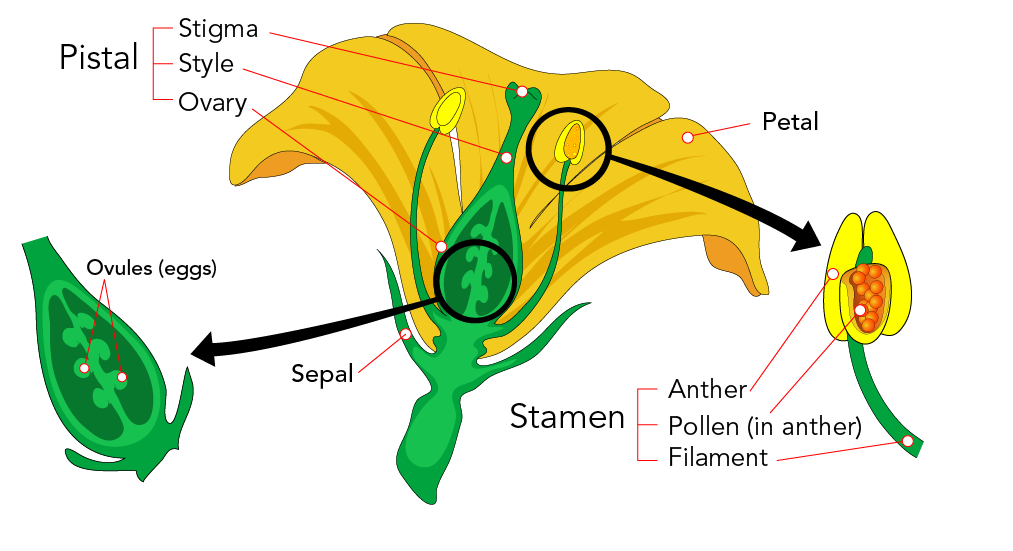[ Just For Laffs ] [ Main Menu ]
6830

From: snodrop, [DNS_Address]
Subject: They do? Huh...ya learn something new every day.
| lol |
Responses:
[6838] [6831] [6832] [6833] [6834] [6835] [6836] [6837]
6838
From: Redhart, [DNS_Address]
Subject: Re: They do? Huh...ya learn something new every day.
|
Well, you sow chicken-feed, of course...and a little egg plant. |
Responses:
None
6831
From: Daisy Lionheart, [DNS_Address]
Subject: Re: They do? Huh...ya learn something new every day.
|
I guess that means the hippies were right all along...We're all essentially 'Flower Children' getting 'Back to the Garden'! Can you dig it? LOL |
6832

From: Eve, [DNS_Address]
Subject: Re: They do? Huh...ya learn something new every day.
|
Fertilization in plants occurs when haploid gametes meet to create a diploid zygote, which develops into an embryo. In gymnosperms (conifers) and angiosperms (flowering plants), the meeting of the gametes occurs in the following way: male gametes are enclosed in pollen grains and are carried by wind or insects to the female reproductive organs. The final product of fertilization--the embryo--is encased in a seed. For this reason, these two types of tracheophytes are termed seed plants. (See Plant Structures and Functions, The Seed.) Gymnosperm Fertilization The female gametophyte contains several archegonia, where the egg cells originate and develop. The gametophyte itself is surrounded by layers of sporangia and integument; all of these elements comprise an ovule, which is found on the surface of a female cone. Fertilization occurs when pollen grains (male gametophytes) are carried by the wind to the open end of an ovule, which contains the eggs, or female gametophyte. There, the pollen grain develops an outgrowth called a pollen tube, which eventually penetrates to the egg cell within one of the archegonia. The sperm cells within the pollen tube then vie to fertilize the egg. Once fertilization has occurred, the embryo develops within the female gametophyte, and the ovule becomes the seed, complete with a food source (the gametophyte tissue) and a seed coat (the integument). This embryo, which will eventually become a new sporophyte, consists of two embryonic leaves, the epicotyl and hypocotyl. Angiosperm Fertilization The female reproductive organ of angiosperms is the pistil, located in the middle of the flower. As in gymnosperms, the male gametophyte is the pollen grain. In order for fertilization to occur in most flowering plants, insects or other animals must transport the pollen to the pistil. A major distinguishing feature of angiosperms is the practice of double fertilization. An angiosperm ovule contains an egg cell and a diploid fusion nucleus, which is created through the joining of two polar nuclei within the ovule. When a pollen grain comes into contact with the stigma, or top of the pistil, it sends a pollen tube down into the ovary at the pistil's base. As the pollen tube penetrates the ovule, it releases two sperm cells. One fuses with the egg to create a diploid zygote, while the other joins with the fusion nucleus to form a triploid nucleus. This triploid nucleus turns into an endosperm, which nourishes the developing embryo (filling the role of gametophyte tissue in the gymnosperm seed). As in gymnosperms, the ovule becomes a seed, encasing the embryo and endosperm in a seed coat. But unlike gymnosperms, in angiosperms the ovary containing the ovules develops into a fruit after fertilization. The fruit gives the embryos the double benefit of added protection against desiccation and increased dispersal, since it is eaten by far-ranging animals who then excrete the seeds. (For a full discussion of the parts of the flower contributing to reproduction, see Plant Structures, Flowers .) In order for fertilization to occur, angiosperms either self-pollinate, in which a particular plant fertilizes itself, or cross-pollinate, in which one plant is fertilized by another of the same species. Cross- pollination generally produces far more vigorous plants, and is encouraged through differential development of the male and female gametophytes on a flower, or through the positioning of these gametophytes so that self- pollination is difficult. |
6833
From: Daisy Lionheart, [DNS_Address]
Subject: Fascinating...Thanks!
|
Yeah...I just didn't know the term 'eggs' was applied to the reproduction of flora. Makes even Veganism seem barbaric, no? Air 'pockets'?? Yum! |
6834
From: Eve, [DNS_Address]
Subject: Re: Fascinating...Thanks!
|
No it is not barbaric but in your mind where the yucky yum is... the eggs are not animal eggs. |
6835
From: Daisy Lionheart, [DNS_Address]
Subject: Re: Fascinating...Thanks!
|
I said the TERM 'eggs' and SEEM barbaric. The 'Yum' was for the air 'pockets' (a food term)...Humor, get it? Lighten up! That anger load you carry around is weighing you down, Ms. GLOOM Cloud!! Where's the 'GOOD News'?...or are you keeping that to yourself? Be of good cheer! REPENT!! |
6836
From: Eve, [DNS_Address]
Subject: Re: Fascinating...Thanks!
|
No I don't get it I have never heard of eating pockets before with a SEEM. It was like you thanked me with a word smack then in your response to mine you keep on smacking. I regret I shared a wonder of creation with you now that's my bad so I am annoyed with myself more than anything though you may translate it as anger as I translated your thank you humor as being insulting which was way more GLOOMY than my sharing of flower biology imo. |
Responses:
[6837]
6837
From: Eve, [DNS_Address]
Subject: Re: Fascinating...Thanks!
|
p.s. thank you for sharing how you really feel in the second response, it was coming through in your first in an indirect manner so now you said I hope it helps bring some relief. |
Responses:
None
[ Just For Laffs ] [ Main Menu ]